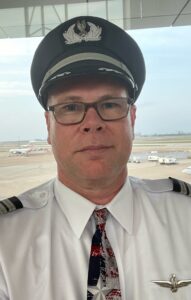As an airline Captain, I’ve often been asked about my favorite cities, flight routes, and lifestyle: What is your favorite city? (Dublin) What routes do you fly? (It’s complicated) Are you married to a flight attendant? (No.) Lately, however, the queries have shifted to labor and operational concerns due to disruptions in major airlines like Delta, United, Southwest, and American. As a line pilot, I can provide some insights into the current state of the airline industry.
Every union has been in contract negotiations for several years. American Airlines and United have been in contract negotiations with their pilot unions since 2019. COVID understandably delayed these, but even with the resurgence of air travel, talks have progressed slowly, burdened by past grievances and perceived broken promises. Union memberships have shown unprecedented actions in response.
Major airline pilot groups have voted to strike over the last couple of months, like dominoes. Delta in November 2022 (99% of those voting). United pilots voted down a contract proposal agreed upon in principle in Nov 2022, and its union leadership voted unanimously to authorize a strike vote this month. American (96%) and Southwest (99%+) in May 2023. An amazing show of solidarity by a labor force. After each vote, informational picket lines formed at every hub, declaring the intent to strike. The long rows of pilots, quietly holding signs and looking professional in their pressed uniforms, immediately familiar to a traveling public, can be a powerful message.
Airline strike votes follow strict procedures due to the significant economic implications aviation holds for the U.S. Unlike other industries, unions can’t initiate labor actions without an exhaustive process. This includes initial negotiation breakdowns, intervention from the National Mediation Board, and executive involvement. Only then can a strike potentially occur, which could trigger significant consequences if other airline unions choose to honor the picket. While we remember the devastating shutdowns and economic impact of the post-September 11 period, a strike, followed by other carrier job actions, could prove even more devastating. During negotiations, job actions like operational slowdowns or ‘sick-outs’ are prohibited by law and can face strict repercussions, making them highly unlikely in the current scenario.
Airline strikes aren’t just about pay, but also involve complex issues like work rules, health, and other benefits. Crucially, they often revolve around scheduling procedures, which directly affect pilots’ personal lives. Being able to schedule days off for significant personal events is vital for pilots, who spend a large part of the month traveling. These seemingly smaller factors contribute significantly to job satisfaction and are central to negotiations.
Operational efficiencies, including aircrew scheduling and training, are pivotal in pilot negotiations. These involve agreement on trip lengths, accommodations, schedule bidding, and trip trading. Training, another operational efficiency, includes regular annual training, transition to new aircraft or captain upgrade, and initial training for new hires, all of which require a specific sequence of agreed-upon events.
Airline management of irregular operations can significantly impact employees and passengers, especially during weather disruptions. Reserve crew notification and use are governed by the labor contract, as are agreed-upon communication and rescheduling processes. Pilots often have valuable input in improving operational efficiency.
Another key efficiency is the systems used to manage and adjust aircrew schedules, which greatly affect the quality of life and are critical in contract negotiations. While airlines prefer to maintain control over schedules and minimize costs, pilots value flexibility in their schedules.
Remuneration, including pay and benefits like sick leave and vacation, are other major negotiation points. Most flight crews are paid hourly, only from the start to the end of a flight. Vacation allotment is based on company tenure, and pilots often have to bid for a year’s worth of vacation months in advance.
Currently, Delta pilots have agreed to a new contract, which could expedite other labor agreements. American and United are in various stages of negotiation, while Southwest negotiations are particularly contentious.
So, with all these labor issues in mind, it is time to answer some pressing questions.
Are the pilots going to strike? No.
Are airlines going to have operational meltdowns this summer? Yes, definitely.
Very few operational improvements to scheduling, reserve crew usage, and reassignment (moving crews around the day’s disrupted schedule) appear in the contracts proposed and signed. Severe weather events will occur and are occurring now and seemingly increasing. The ability of airlines to anticipate and respond to them has not been overly comforting.
Are there enough pilots? Never. There are never enough well-trained, motivated, and available pilots to hire and train, and that number is not meeting demand. That’s a story for another day. But another issue is air traffic control: the FAA cannot maintain enough controllers to meet demand in the extreme growth of travel since 2021 and has warned airlines to be prepared to pare down schedules rather than just add more flights as the public comes to fly. Disruptions for events other than weather are to be expected.
As the next year sees all pilot contracts agreed to and implemented, other labor unions (customer service representatives, ramp workers, flight attendants, maintenance) are working to move toward similar upgrades. This means a few things. First, air travel will not get cheaper. Demand is high, will remain high, and costs associated with the industry are rising. Second, disruptions from a number of causes will occur. But at the end of the flight, I, like nearly every one of my fellow pilots and flight attendants, have one goal in mind: To stand at the flight deck door, thank each one of my passengers for their patronage, greet my young travelers, and having done my absolute best to get you to where you want to be, on time, and as smoothly and safely as possible. And hopefully in Dublin.
_________________________________________________________________________________________________________

and civilian aviation.






